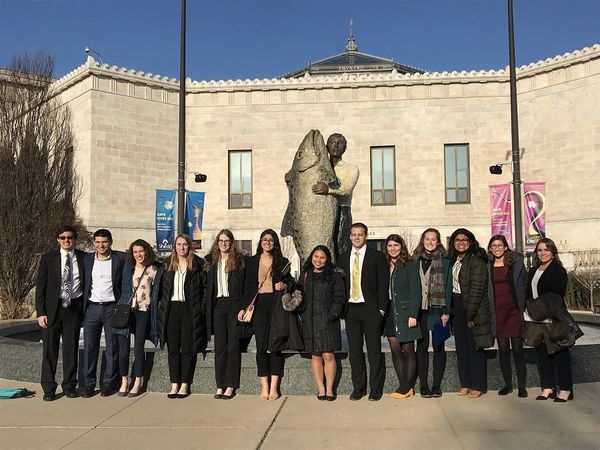
During the afternoon portion of the sustainability trek in Chicago, students on the non-technical track had the opportunity to visit one of Chicago’s most popular attractions: Shedd Aquarium in Chicago’s lakeside “Museum Campus.” Our student group spent time speaking with professional scientists from Shedd’s Daniel P. Haerther Center for Conservation and Research, many of whom spend their days performing experiments, collecting information from and contributing to scientific publication, and doing observational research in the field.
Each of the scientists was able to give a brief presentation on their career trajectories, often using a more personal vein to talk about specific interests or experiences they’d had growing up to lead them into to the field of conservation science. They explained not only the steps they’d taken (such as undergraduate studies & extracurriculars, graduate school, or post-doc research positions), but also the “why?” that inevitably comes up in between these steps— the thoughts and decisions that surfaced at their various forks in the road.
The scientists were also able to contribute interesting comparisons between working at an independent institution like Shedd with following a more traditional research scientist track in academia. They described how although one might not have all of the same access to information or proximity to other colleague experts in the field than could be found at a university, the institution makes up for this in other ways: the strong connections to public communication, the more holistic forms in which scientists are evaluated, and the enthusiasm their research receives from visitors everyday make Shedd a stimulating and rewarding place to work.

At the end of our visit, we were able to do a quick tour of the newest lab, home of Shedd’s new Aquarium Microbiome Project. Here, research is being done on the relationships between microbes and the larger organisms that share their same aquatic environments. This was especially interesting to me as someone who just recently took a biology module called “The Role of the Microbiome in our World,” and who just began work in an aquatic ecology lab this semester. Seeing subjects I’ve learned about in the classroom and lab being actively investigated at one of our nation’s top aquariums was really neat!
For me, this was valuable experience because it allowed me to view an alternate destination for a research scientist (I’m able to observe the more straightforward academia route most days from those teaching my science classes and labs!), and to see an example of the kind of complex work that goes on “behind the scenes” at public science institutions such as museums, zoos, and aquariums— some of the places I’ve most enjoyed frequenting growing up.
Read more about the "technical track" of the Sustainability Career Trek, written by Marissa Kivi ('19).
Originally published by at undergradcareers.nd.edu on February 25, 2019.